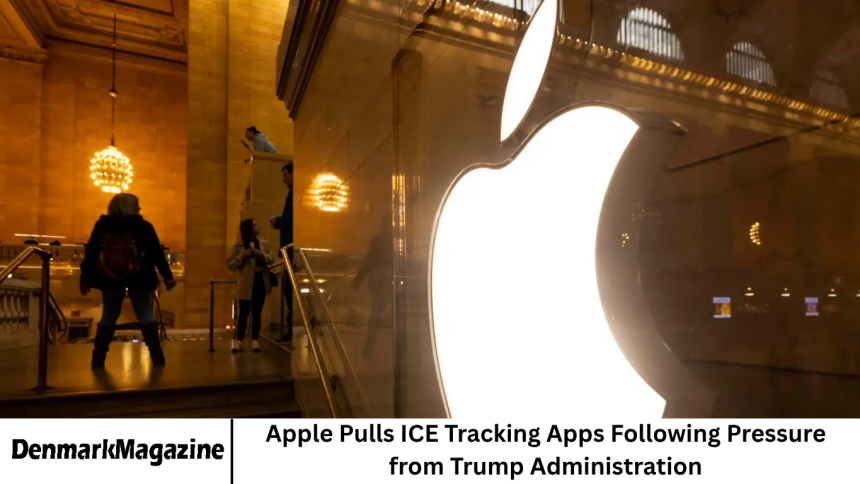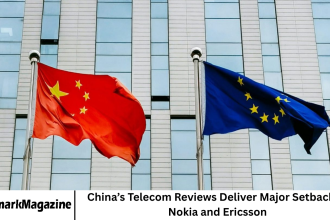In a move that has ignited controversy and debate across the technology and human rights communities, Apple has reportedly removed several mobile applications used to track U.S. Immigration and Customs Enforcement (ICE) activity. Critics argue that the move represents a troubling concession to political pressure.
- Background: How ICE Tracking Apps Emerged
- The Political Pressure Campaign on Apple
- Apple’s Official Explanation
- Developer Reactions and the Fallout
- Human Rights Concerns and Digital Censorship
- The Broader Context: Big Tech and Government Pressure
- Impact on Immigrant Communities
- Tech Policy Experts Weigh In
- Legal and Ethical Implications
- Global Repercussions and Industry Trends
- Apple’s Reputation and Public Backlash
- The Road Ahead: What Comes Next
- Frequently Asked Question
- Conclusion
The removal of these apps — some of which were designed to alert users about ICE raids, detention centers, or immigrant support services — has raised serious questions about Apple’s stance on free speech, corporate responsibility, and the balance between public safety and civil liberties.
This article explores the context, political motivations, and broader implications of Apple’s decision, examining how it fits into the ongoing tension between Big Tech, government oversight, and the rights of marginalized communities. While supporters claim it’s a necessary step to prevent potential misuse of technology.
More Read: China’s Telecom Reviews Deliver Major Setback to Nokia and Ericsson
Background: How ICE Tracking Apps Emerged
Over the past decade, mobile technology has become a vital tool for immigrant communities navigating complex legal systems and facing deportation threats. Apps like Notifica, Migrant SOS, and ICE Watch were designed to empower undocumented individuals and their allies by providing real-time alerts about ICE raids, legal aid resources, and know-your-rights information.
Developed by grassroots organizations, nonprofits, and independent developers, these apps played a crucial role in helping vulnerable populations stay informed and connected. For many, they were lifelines in uncertain times — tools for safety and awareness, not lawbreaking.
However, the Trump administration, which prioritized aggressive immigration enforcement throughout its tenure, viewed these apps with hostility. Officials within the Department of Homeland Security (DHS) and ICE argued that the platforms posed a “national security concern,” claiming they undermined federal operations by warning targets ahead of enforcement actions.
The Political Pressure Campaign on Apple
According to multiple sources familiar with the matter, Trump administration officials began privately urging Apple and Google in early 2020 to remove apps they believed interfered with ICE activities. Though neither company confirmed receiving direct orders, several developers later reported receiving legal threats.
And “policy violation” notices soon after public statements from White House officials condemning the apps. Behind the scenes, Apple reportedly faced increasing political pressure. Senior figures in the administration framed the issue as a matter of “law and order,” while conservative media outlets launched campaigns accusing tech companies of “aiding illegal immigration.”
These campaigns sought to portray apps that shared ICE raid locations or community alerts as tools for obstruction. The White House also hinted that failure to act could result in regulatory scrutiny under antitrust laws — a subtle but unmistakable threat in an era when Big Tech was already facing congressional investigations.
By mid-2025, Apple quietly began reviewing and delisting several apps that contained “user-generated enforcement location data,” citing violations of its App Store policy related to “harmful or misleading information.”
Apple’s Official Explanation
In a carefully worded statement, Apple said: “We regularly review applications on the App Store to ensure they comply with our safety and legal guidelines. Apps that share sensitive law enforcement data or facilitate unsafe behavior may be subject to removal.”
While Apple did not explicitly mention ICE or the Trump administration, the timing and the nature of the removals left little doubt among observers about the political context. Apple emphasized that the decision was not political but rather “consistent with long-standing App Store policies.”
The company pointed to clauses that prohibit apps from encouraging illegal activity or sharing real-time data about law enforcement movements. However, immigrant rights advocates and digital privacy experts disputed that interpretation, arguing that the company was selectively enforcing its policies under political pressure.
Developer Reactions and the Fallout
App developers and civil rights groups were quick to condemn the move. Organizations such as Mijente, United We Dream, and the Electronic Frontier Foundation (EFF) accused Apple of capitulating to government coercion and silencing tools that helped protect immigrant communities.
A spokesperson from Mijente told reporters: “These apps didn’t encourage lawbreaking — they helped people know their rights, find legal aid, and stay safe. Apple’s decision effectively strips away digital protections from those who need them most.”
Developers who maintained the apps described a frustrating and opaque process. Several said their appeals were rejected without detailed explanations, and in some cases, their developer accounts were temporarily suspended.
One app creator, who requested anonymity due to fear of retaliation, said: “We built these tools with transparency and community input. Apple’s takedown notice cited vague ‘safety concerns’ but offered no evidence. It’s clear the motivation wasn’t about user safety — it was political pressure.”
The removals also extended beyond the U.S. App Store, affecting global users and advocacy networks that relied on these apps for cross-border solidarity efforts.
Human Rights Concerns and Digital Censorship
Human rights organizations expressed alarm over Apple’s actions, calling it an example of “corporate complicity in government censorship.”
The American Civil Liberties Union (ACLU) issued a statement condemning the move, noting that digital tools for marginalized communities are increasingly being targeted under the guise of “security concerns.”
The ACLU’s statement read: “Removing apps that provide critical information to immigrant communities doesn’t enhance safety — it silences vulnerable populations. Apple’s compliance with political pressure sets a dangerous precedent.”
The concern is not new. Over the years, Apple has faced criticism for removing apps under political duress in various countries — from VPN services in China to protest-mapping tools in Hong Kong. The ICE app removals appear to follow a similar pattern, suggesting that even in democratic societies, corporate gatekeepers can effectively suppress information under government pressure.
The Broader Context: Big Tech and Government Pressure
Apple’s decision highlights a recurring tension between Big Tech companies and government authorities. On one hand, these corporations are expected to uphold ethical standards, protect users’ rights, and promote transparency. On the other hand, they operate within legal and regulatory frameworks that make them vulnerable to political influence.
Under the Trump administration, this tension reached new heights. The White House frequently leveraged public statements and private meetings to push tech giants toward certain policy directions — whether on content moderation, national security, or economic matters.
Critics argue that Apple’s removal of ICE-tracking apps shows how easily political rhetoric can translate into corporate compliance, especially when framed as “law enforcement cooperation.” Supporters of the administration’s stance counter that private companies have the right.
And even the obligation — to prevent their platforms from being used in ways that obstruct legal authorities. The dilemma underscores a larger question: where should companies like Apple draw the line between compliance with government requests and protection of user freedoms?
Impact on Immigrant Communities
The consequences of the removals have been deeply felt among immigrant communities. For many undocumented individuals, these apps were part of a broader support ecosystem — providing instant alerts, access to legal representation, and emergency contact networks.
Without these tools, advocacy groups say, users are more vulnerable to surprise raids and deportations. Community networks have had to rely on older, less reliable communication methods like text trees and word-of-mouth alerts.
Grassroots organizations have since shifted focus to encrypted messaging platforms like Signal and Telegram, where they can maintain some level of privacy and coordination. However, these platforms lack the accessibility and organization of dedicated apps.
The chilling effect extends beyond immigrant advocacy: developers across the social justice tech sector are now questioning whether their work could be the next target of political backlash.
Tech Policy Experts Weigh In
Digital policy experts say Apple’s move represents a key moment in the evolution of corporate governance in the tech space. Dr. Alicia Benton, a technology ethics researcher at Stanford University, commented: “We’re witnessing a blurring of the lines between corporate discretion and political compliance.
When a company as influential as Apple takes action that aligns with political demands, even indirectly, it reshapes public trust.” Experts point out that Apple’s closed ecosystem — where the App Store acts as the sole distribution channel for iOS apps — gives the company immense control over what content reaches users.
While Apple markets this as a security feature, critics say it allows the company to act as a de facto gatekeeper for information. This power imbalance has renewed calls for antitrust reforms and app store regulation, including potential requirements for transparency in takedown decisions.
Legal and Ethical Implications
From a legal perspective, Apple’s actions fall within its contractual rights as a platform operator. The company’s App Store policies give it broad discretion to remove apps that violate its guidelines. However, the ethical debate is far murkier.
By removing apps under perceived political pressure, Apple may have crossed into the territory of corporate censorship. Legal scholars note that while the First Amendment restricts government censorship, not private companies, the effect is often similar when a single corporation controls such a large portion of public discourse.
Furthermore, if Apple acted following informal government “suggestions,” it raises questions about state-induced censorship — a gray area where government influence leads to private sector suppression without explicit legal orders.
In past legal precedents, such as Bantam Books v. Sullivan (1963), the U.S. Supreme Court held that government coercion of private entities to suppress information can still constitute a violation of free expression. Some digital rights advocates suggest Apple’s situation might fit this mold, though proving coercion would be complex.
Global Repercussions and Industry Trends
Apple’s decision has drawn international scrutiny. Technology regulators in the European Union have begun reviewing whether the removals could constitute a breach of digital rights under EU law. Meanwhile, developers in Latin America and Canada — where similar ICE-related alerts are used to track immigration enforcement — have expressed concern about the ripple effect.
The issue also feeds into the ongoing debate over app store monopolies. Both Apple and Google have faced lawsuits and legislative proposals aimed at reducing their control over mobile ecosystems. Critics argue that the ICE app removals highlight why such reforms are necessary — to prevent corporations from becoming political tools.
Some U.S. lawmakers, particularly on the Democratic side, have called for hearings into the incident. Senator Elizabeth Warren remarked: “If political pressure can dictate what apps Americans are allowed to use, that’s a problem for democracy, not just the App Store.”
Apple’s Reputation and Public Backlash
Apple has long positioned itself as a champion of privacy and human rights, often touting its refusal to compromise user data even under government requests. This decision appears to conflict with that image, sparking backlash from activists, consumers, and even some employees.
On social media, hashtags like #AppleCensors and #StandWithImmigrants trended for several days following the removals. Thousands of users signed petitions demanding Apple reinstate the affected apps, while others accused the company of hypocrisy. Despite the criticism, Apple has not reversed its decision or offered additional clarification.
The company seems to be betting that the controversy will fade, as it often has in past policy disputes. However, analysts warn that this incident could leave lasting scars on Apple’s reputation as a defender of digital rights.
The Road Ahead: What Comes Next
For now, developers are exploring alternative hosting options — including web-based tools that circumvent app store restrictions. Meanwhile, advocacy groups are calling for legislative safeguards to protect digital tools used by vulnerable populations.
Some industry observers suggest that Apple could mitigate the backlash by introducing a “Transparency Report” specifically for politically sensitive app removals. Such reports could disclose when and why apps were delisted, including any government communications involved.
Ultimately, the controversy underscores a deeper societal dilemma: how should technology companies navigate competing obligations to users, governments, and the law? The answer, as always, lies in the balance between security, freedom, and ethics — a balance that grows more precarious with each new flashpoint.
Frequently Asked Question
What apps did Apple remove in relation to ICE tracking?
Apple delisted several community-driven apps, including Notifica, ICE Watch, and Migrant SOS, which provided alerts about immigration raids, detention centers, and legal resources. The company cited policy violations related to sharing sensitive law enforcement data.
Did the Trump administration directly order Apple to remove these apps?
There was no formal legal order, but multiple sources suggest that the administration exerted informal political pressure, framing the apps as “obstructive” to ICE operations. Apple’s actions closely followed this campaign.
How did Apple justify its decision?
Apple stated that the removals were consistent with its App Store policies against apps that promote unsafe behavior or share sensitive law enforcement information. However, critics argue that this justification masks political compliance.
How have immigrant rights groups responded?
Organizations such as Mijente, ACLU, and United We Dream condemned Apple’s decision, accusing the company of silencing vulnerable communities and aiding government overreach. They argue that the apps were educational and protective, not obstructive.
Could Apple face legal repercussions for the removals?
While Apple is legally allowed to remove apps that violate its policies, it could face scrutiny if evidence emerges that it acted under government coercion. Some lawmakers have called for greater transparency and accountability in such decisions.
What does this mean for developers creating social justice apps?
The incident has created a chilling effect, making developers wary of creating apps tied to activism or government criticism. Many are now exploring decentralized or web-based alternatives to avoid corporate gatekeeping.
How does this incident fit into Apple’s global record on censorship?
Apple has previously removed apps under government pressure in China, Russia, and Hong Kong. The ICE app removals in the U.S. reflect a continuation of that pattern — raising concerns about how much influence governments hold over global tech platforms.
Conclusion
Apple’s decision to pull ICE-tracking apps following pressure from the Trump administration represents more than a corporate policy dispute — it’s a defining moment in the intersection of technology, politics, and human rights. It raises profound questions about how much influence governments should have over private platforms.
And how much power corporations should wield in shaping access to information. Whether Apple’s move is remembered as a necessary act of compliance or a capitulation to political pressure will depend on the broader public response and the future of digital governance.








